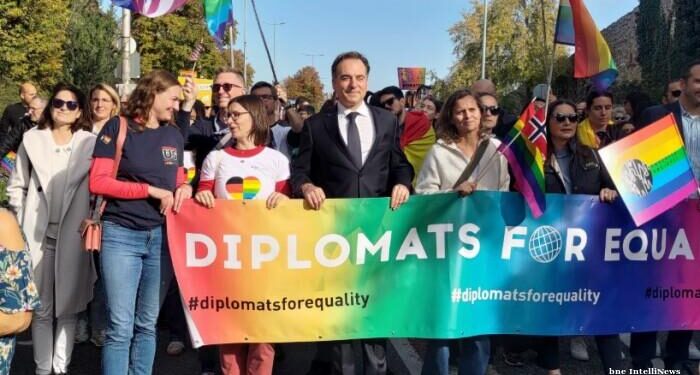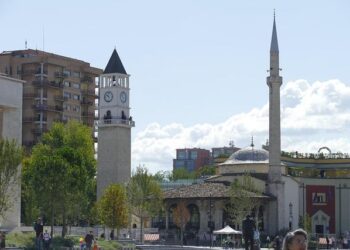AlbaniaŌĆÖs Political Milestone: Prime Minister Edi Rama Clinches Fourth Term with Visionary Reform Agenda
In a historic political development, AlbaniaŌĆÖs Prime Minister Edi Rama has secured an unprecedented fourth consecutive term, reaffirming his leadership and signaling a commitment to transformative governance. Speaking to jubilant supporters following the election results, Rama unveiled an ambitious plan aimed at ŌĆ£permanently reshaping Albania.ŌĆØ His administration is set to confront pressing national challenges by prioritizing economic revitalization, infrastructure modernization, and enhanced social services. As the country emerges from the pandemic’s aftermath and intensifies its pursuit of European Union integration, this renewed mandate injects fresh hope among Albanians eager for sustainable progress.
A Vision for Sustainable Progress: PM RamaŌĆÖs Comprehensive Development Framework
With his fourth term underway, Prime Minister Rama has presented a detailed roadmap focused on driving Albania toward innovation-led growth and inclusive prosperity. At the heart of this strategy lies a commitment to social justice, coupled with environmentally responsible growth. Key pillars include:
- Expansion of Renewable Energy Sources: Emphasizing investments in solar farms and hydroelectric facilities designed to lower carbon footprints while positioning Albania as a leader in clean energy within the Balkans.
- Digital Infrastructure Enhancement: Rolling out nationwide broadband initiatives targeting underserved rural communities to bridge digital disparitiesŌĆöboosting education access, entrepreneurship opportunities, and e-governance capabilities.
- Healthcare Modernization Efforts: Allocating increased resources toward upgrading hospitals alongside specialized training programs for medical personnel aimed at elevating care quality across both metropolitan areas and remote regions.
- Education System Overhaul Focused on Future-Ready Skills: Reforming curricula with an emphasis on STEM disciplines integrated with critical thinking skills that prepare Albanian youth for participation in global technology-driven markets.
The government also intends substantial improvements in transport networks designed not only to ease internal mobility but also stimulate tourismŌĆöa sector contributing nearly 8% of GDP as reported in 2023 by national statistics agencies. Major projects encompass widening highways around Tirana; modernizing rail lines connecting coastal towns; plus enhancing visitor infrastructure near heritage landmarks such as Gjirokast├½r Fortress. Complementary policies aim at boosting foreign direct investment (FDI), which surged over 12% last year according to data from the Albanian Investment Development Agency (AIDA), ultimately fostering job creation within local economies.
| Project Name | Description | Expected Impact |
|---|---|---|
| Main Highway Expansion Initiative | Diversifying arterial routes linking Tirana with northern provinces. | Smoother traffic flow reducing travel times; improved logistics supporting commerce. |
| Sustainable Railway Modernization Program | Migrating from legacy systems towards electrified trains featuring optimized schedules. | Easier passenger transit; expanded freight capacity facilitating exports growth. |
Tackling Economic Growth Amidst Societal Challenges
The road ahead demands nuanced approaches balancing robust economic expansion alongside urgent social reforms. Persistent obstacles such as unemploymentŌĆöhovering near 11% nationallyŌĆöand endemic corruption continue eroding public confidence while deterring investment inflows. To address these issues comprehensively, the government emphasizes multi-layered interventions including:
- Revamping Education Systems: Aligning teaching methodologies more closely with labor market needs ensures young people are equipped for emerging sectors like IT services or renewable energy industries.< / li >
- < strong >Expanding Healthcare Access:< / strong > Broadening insurance coverage combined with telehealth solutions aims at reaching marginalized populations effectively.< / li >
- < strong >Supporting Small & Medium Enterprises (SMEs):< / strong > Providing financial grants paired with entrepreneurial training fosters SME developmentŌĆöa critical driver accounting for nearly two-thirds of national employment.< / li >
- < strong >Environmental Protection Initiatives:< / strong > Enforcing conservation laws safeguarding forests along the Albanian Alps while promoting eco-tourism balances ecological preservation alongside economic opportunity.< / li >
< / ul >This holistic approach aligns tightly with AlbaniaŌĆÖs strategic objective of Euro-Atlantic integrationŌĆöstrengthening NATO partnerships while advancing EU accession negotiations stalled since early last decade due partly to governance concerns. Achieving success will depend heavily on transparent leadership practices involving cooperation between governmental institutions, civil society watchdogs monitoring reform implementation, plus international partners providing technical expertise or financial support exceeding Ōé¼500 million recently pledged by EU bodies alone.
Cultivating Democratic Participation: Empowering Citizens Through Inclusive Governance
The electoral victory also highlights evolving democratic values where citizen engagement plays an increasingly central role in shaping policy agendas. Recognizing this shift towards participatory democracy, PM Rama champions creating inclusive platforms encouraging public discourse beyond conventional political channelsŌĆöthereby strengthening accountability through mechanisms such as:
- Regular town hall forums enabling direct dialogue between officials & residents addressing local priorities;
- Digital tools facilitating real-time consultations via mobile applications or web portals;
- Community-led workshops empowering grassroots organizations involved in neighborhood planning or environmental stewardship projects; < / ul >
This dedication seeks not only bridging gaps between policymakersŌĆÖ intentions & citizensŌĆÖ expectations but also embedding transparency norms vital for democratic resilience amid regional geopolitical uncertainties impacting Southeast Europe today. With nearly half its population under age 35ŌĆöthe highest youth demographic share across Western BalkansŌĆöthe government envisions these initiatives nurturing sustained civic involvement that bolsters national unity & socio-political stability moving forward.
Civic Engagement Program Main Anticipated Outcomes Public Consultation Forums Policies better tailored toward community needs; increased responsiveness from authorities < td style = "padding:10px;">Online Participation Platforms < td style = "padding:10px;">Wider inclusion spanning diverse demographics including youth & marginalized groups < td style = "padding:10px;">Local Capacity-Building Workshops < td style = "padding:10px;">Empowerment enabling grassroots groups driving localized change efforts effectively A Forward-Thinking Outlook on Albania’s Trajectory Under PM Edi Rama’s Stewardship
Edi RamaŌĆÖs renewed tenure embodies both significant opportunity and formidable ambition aimed at systemic transformation across multiple domainsŌĆöfrom economic vitality through environmental sustainability down to societal cohesionŌĆöin one of Southeast EuropeŌĆÖs most dynamic nations today. The ultimate success story depends upon converting visionary commitments into concrete improvements impacting daily lives throughout urban hubs like Durr├½s or mountainous rural areas near Shkod├½r alike.
If executed diligentlyŌĆöwith stringent oversight ensuring transparencyŌĆöthe proposed reforms could accelerate Albania’s rise onto broader European stages marked by competitive economies yet socially inclusive frameworks. As global trends increasingly prioritize sustainability paired with digital innovation, “transforming Albania forever” might soon transcend campaign slogans becoming tangible realities experienced widely among its citizens.
ADVERTISEMENT
















